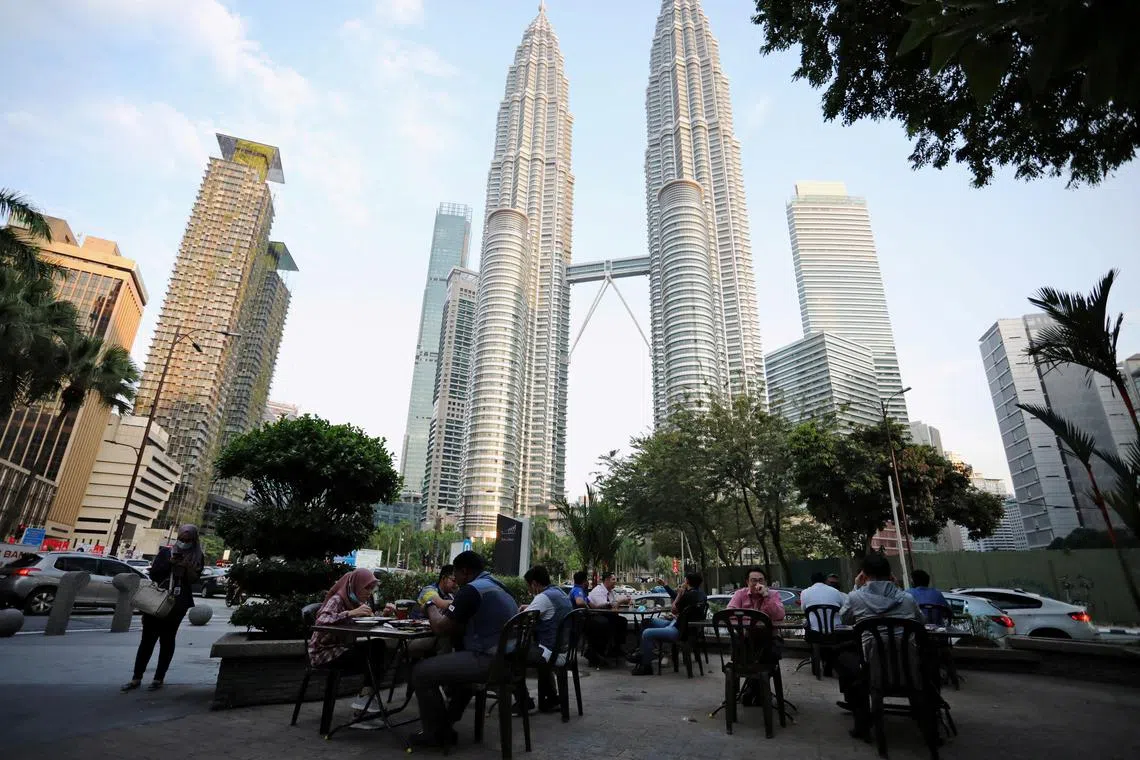Malaysia’s private consumption could be bright spark amid dim economic outlook
Sign up now: Get insights on the biggest stories in Malaysia

Bank Negara expects Malaysia’s economic growth to moderate in 2023.
PHOTO: REUTERS
Follow topic:
KUALA LUMPUR – Private consumption could be the bright spark amid Malaysia’s economic gloom, with retailers like local hypermarket chain Mydin and United States tech giant Apple making plans for expansion.
Some analysts and businesses say factors such as China reopening its borders and firmer commodity and oil prices will also be a boost to the economy.
Australian retailer Harvey Norman announced in December that it is looking to open another 52 stores in Malaysia within the next six years. The company also expects double-digit growth in sales in 2023.
Apple is planning to set up its first stores in Malaysia and has started to hire employees locally. It already has stores in Thailand and Singapore.
Mydin, which has 61 branches in Malaysia targeting low-income groups, plans to open up to three new outlets in 2024.
Datuk Ameer Ali Mydin, managing director of Mydin, said private consumption is expected to increase in 2023, noting that there was already a spike in footfall in all its outlets.
“The footfall in January is 10 per cent above pre-Covid-19 levels in 2019. We foresee this momentum continuing due to stronger commodity prices that will increase the disposable income of farmers,” he told The Straits Times.
These moves appear to buck the results of surveys that said Malaysia faces rising economic pessimism.
Recent polls like the PwC Global CEO Survey revealed that 74 per cent of Malaysian chief executives foresee global economic growth declining in the next 12 months.
According to the survey, these executives cited inflation, macroeconomic volatility and geopolitical conflict as the top three threats to economic growth in 2023.
Another survey, the 2023 Edelman Trust Barometer, found that economic optimism in Malaysia is currently at an all-time low, dropping 20 percentage points since the 2022 edition.
However, analysts have predicted some positives for 2023.
Bank Islam chief economist Firdaos Rosli said a significant boost to the economy will come from China reopening its borders and stronger commodity and oil prices, as well as recovery in the service sector, including tourism and private education.
Malaysia’s private consumption could rise further in 2023, assuming the government maintains its fuel subsidies this year, Mr Firdaos told ST. Bank Islam estimates private consumption to register a double-digit growth of 12.4 per cent in 2022.
“The government targets the arrival of five million tourists from China... The anticipated decline in unemployment rate due to improvements in labour market will also spur domestic consumption,” added Mr Firdaos.
Another positive signal is the central bank’s decision in January to keep the overnight policy rate unchanged at 2.75 per cent, after four consecutive interest rate hikes last year appeared to have brought inflation under control.
Headline inflation figures softened to 3.8 per cent year on year in December 2022 from 4 per cent in November.
“The interest rate pause by Bank Negara also means the cost of borrowing by households and businesses will be static. Its impact on borrowers’ disposable income is neutral unless the central bank decides to hike rates in early March or May 2023,” said Mr Firdaos.

Some analysts and businesses say factors such as China reopening its borders and firmer commodity and oil prices will also be a boost to the economy.
PHOTO: REUTERS
Malaysia’s participation in the Comprehensive and Progressive Agreement for Trans-Pacific Partnership and the Regional Comprehensive Economic Partnership could also boost the nation’s exports, said MIDF Research.
The research house expects Malaysia’s exports growth to moderate to 9.2 per cent in 2023, after posting a strong post-pandemic expansion of 25 per cent in 2022.
“We expect continued rise in demand for electronics and electrical and commodities to continue driving Malaysia’s exports, while sustained rise in domestic spending and business activities will support imports,” said MIDF Research.
Bank Negara expects Malaysia’s economic growth to moderate in 2023, falling to between 4 per cent and 5 per cent after recovering strongly from the low-base effect of the pandemic in 2022.
It estimates that gross domestic product growth in 2022 likely surpassed the government’s official forecast of 6.5 per cent to 7 per cent.
The American Malaysia Chamber of Commerce (AmCham), a business association comprising about 290 American, Malaysian and other international companies, is also cautiously optimistic about 2023.
AmCham CEO Siobhan Das expects more high-value investments to flow into Malaysia as the association’s members continue to expand their operations.
“Companies continue to leverage the inherent advantages that Malaysia has to offer in the form of an established manufacturing base... a proven track record of providing a skilled workforce, and government policies that are designed to support growth opportunities and ensure Malaysia remains an integral part of the global trading ecosystem,” she told ST.


